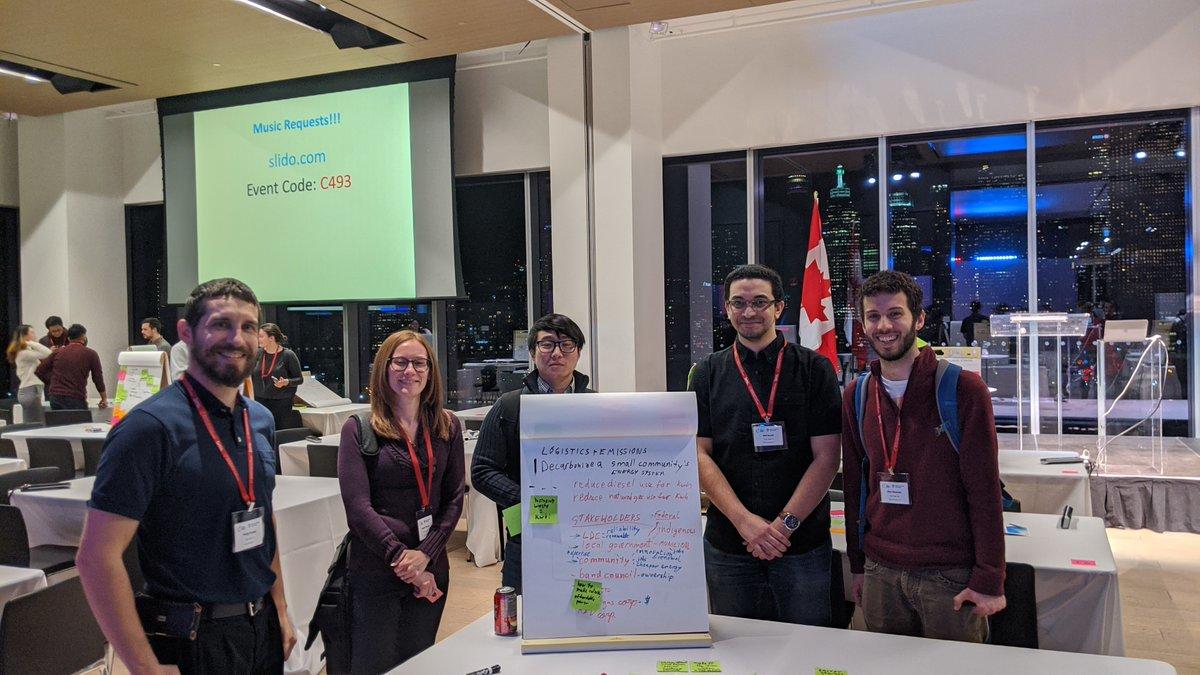Conestoga students and faculty were part of teams honoured with awards at the inaugural Canada 2020 How to Change the World program in Toronto, February 19-21. The experiential education program saw 200 participants, experts and facilitators from across sectors and disciplines collaboratively tackle complex societal challenges.

Energy Systems Engineering Technology students and faculty participated in the How to Change the World program from February 19-21, collaboratively tackling complex societal challenges.
Launched in 2014 at the University College London, How to Change the World programs are delivered globally to help equip post-secondary students and early-career engineering, business and policy professionals with the ability to harness the technical knowledge and skills from their disciplines to create positive sustainable change in their organizations and communities. Canada’s 2020 program was organized in partnership with the Canadian and Ontario societies of professional engineers and challenged participants to explore solutions based on the United Nations’ Sustainable Development Goals paired with specific local contexts.
Conestoga Energy Systems Engineering Technology students Alan Gilchrist, Seif Ismail, Siheon Kim and Jessica Patrick, as well as part-time faculty member Phillip Drader, were among participants pooling collective interests, expertise and perspectives to address challenges here in Canada and abroad. Gilchrist, Ismail and Drader were members of two teams honoured as most innovative for their proposed solutions.
Based on interests and backgrounds, participants were assigned to small, highly diverse teams within larger cohorts tackling the same challenge. The program saw roughly 35 groups take on challenges across four cities. Each team collaborated while engaging with sets of experts from partner organizations that understood the complex issues faced by local stakeholders and how to develop implementable solutions. The program closed with teams presenting at a public showcase with an experienced judging panel identifying the most innovative, implementable and best overall ideas for each city.
Gilchrist and his team were assigned to find solutions for sustainability issues faced in San José, Costa Rica. They chose to focus on transportation.
“We learned that one of the biggest issues San José faces with public transportation is that it’s not run by any sort of public body like the government,” said Gilchrist. “There are more than 150 independent bus companies providing service in the city and they don’t communicate with each other or form any kind of grid, and they operate to maximize their profit. What you’re left with is a not very efficient transit system.”
The group proposed a solution that would see a system of community-run electric shuttles to create safe, reliable and sustainable public transportation. According to Gilchrist, the solution ties into Costa Rica’s plans to decarbonize by 2050 and empowers the less-advantaged communities of San José so that they may contribute to the city’s economic development.
Ismail, Drader and their team developed a solution to address sustainability in Inuvik, focusing on realistic actions to tackle employment rates, quality of life and affordability.
For Patrick, who focused on supplying energy to a remote village in the Himalayan mountains, participating in the challenge proved to be an enriching experience. For her, opportunities for professional development and involvement were some of the reasons she chose the Energy Systems Engineering program and Conestoga.
“It was really inspiring,” said Patrick. “Listening to everyone’s ideas and gaining more insight into engineering, as well as business and politics, really showed me that all the knowledge I am gaining in school can be applied to make a lasting and positive impact in the real world, not just in Canada, but in every nation on the planet.”
The three-year Energy Systems Engineering Technology - Electrical program is specifically designed to meet the high demand for engineering technologists in electrical power generation, transmission and distribution, as well as in low-carbon energy systems, smart building and energy management. With strong industry support, students benefit from relevant field trips, active mentorship and well-established, high-quality labs.
